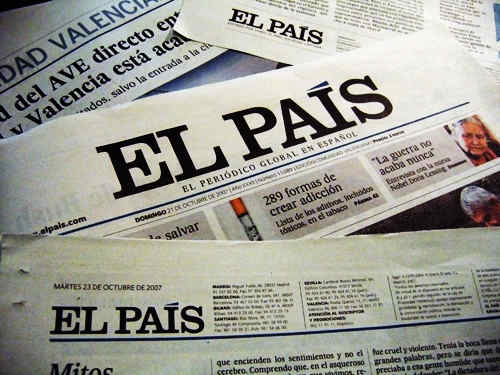今天是世界新聞自由日。西班牙聯邦記者協會于日前發出警告稱,自2008年經濟危機爆發以來,西班牙已有超過6000名記者丟了工作。該協會主席表示,這是西班牙新聞工作者有史以來遭遇的最嚴峻的局勢。他還指出,上一季度的統計數字依然驚人,而且前景黯淡。該協會稱,此次經濟危機爆發以來,西班牙有6234名記者失去工作,有57個媒體機構關停,另有23家媒體機構進行了裁員。目前,西班牙最暢銷的兩家日報也在計劃大規模裁員和減薪;有些報紙受經濟危機影響已經停止印刷,只發行電子版。專業人士指出,裁員和減薪會讓新聞工作者承受更多壓力,同時也會影響到新聞報道的質量。

 |
|
?More than 6,000 journalists have lost their jobs in Spain in the three years since the economic crisis broke out, the industry warned ahead of World Press Freedom Day on Thursday. |
More than 6,000 journalists have lost their jobs in Spain in the three years since the economic crisis broke out, the industry warned ahead of World Press Freedom Day on Thursday.
"It is the most severe situation journalism in Spain has gone through in all its history," said Elsa Gonzalez, president of the Spanish Federation of Journalists' Associations.
"The figures for the last quarter are alarming and the outlook is dark."
The association, which represents 21,000 members of the profession, says that 6,234 journalists have lost their jobs since the worst of the financial and economic crisis began in late 2008.
Fifty-seven media organisations have closed down and 23 have made lay-offs.
Now Spain's two biggest-selling daily newspaper, El Pais and El Mundo, are planning mass job cuts too, says Fernando Cano, editor of the specialist media news site prnoticias.com.
El Mundo plans to lay off a third of its journalists, cutting some 195 jobs, and El Pais is likely to make comparable cuts, he said.
The left-wing daily Publico, which champions victims of the economic crisis and criticises the ruling class, now has only an online presence since it scrapped its print edition in February with the loss of 160 jobs.
"It is a situation of unemployment and also of precariousness, because salaries have fallen in all the media," Gonzalez said.
Cano added: "They must do the same work with fewer people and those who remain have their salaries reduced. They are under more pressure and must work more while earning less."
It is harming the quality of news coverage, he argued.
"If a news organization is so weakened, it cannot fulfill its role of guaranteeing the citizens' right to free information," Gonzalez said.
"If it receives information that is well presented, it gets published or broadcast directly, without checking or digging to see what lies behind it."
As in the case of Publico, falling advertising revenue is the cause.
Cano says that advertising revenues have fallen by 22 percent in the press, 17 percent in television and 11 percent in radio.
Spain's economic crisis dates to the bursting of its construction bubble in 2008.
"In Spain, just like in construction, everything is oversized," Cano said.
"As well as having lots of general newspapers, it is unusual in having three locals in every province. It is just not viable," he added. "A restructuring of the sector is clearly needed. This cannot go on."
The federation has called for rallies in 40 towns across Spain on Thursday to mark World Press Freedom Day, to "demand better conditions for journalists and raise awareness that weakening journalism also weakens democracy."
相關閱讀
(Agencies)

(中國日報網英語點津 Helen 編輯)